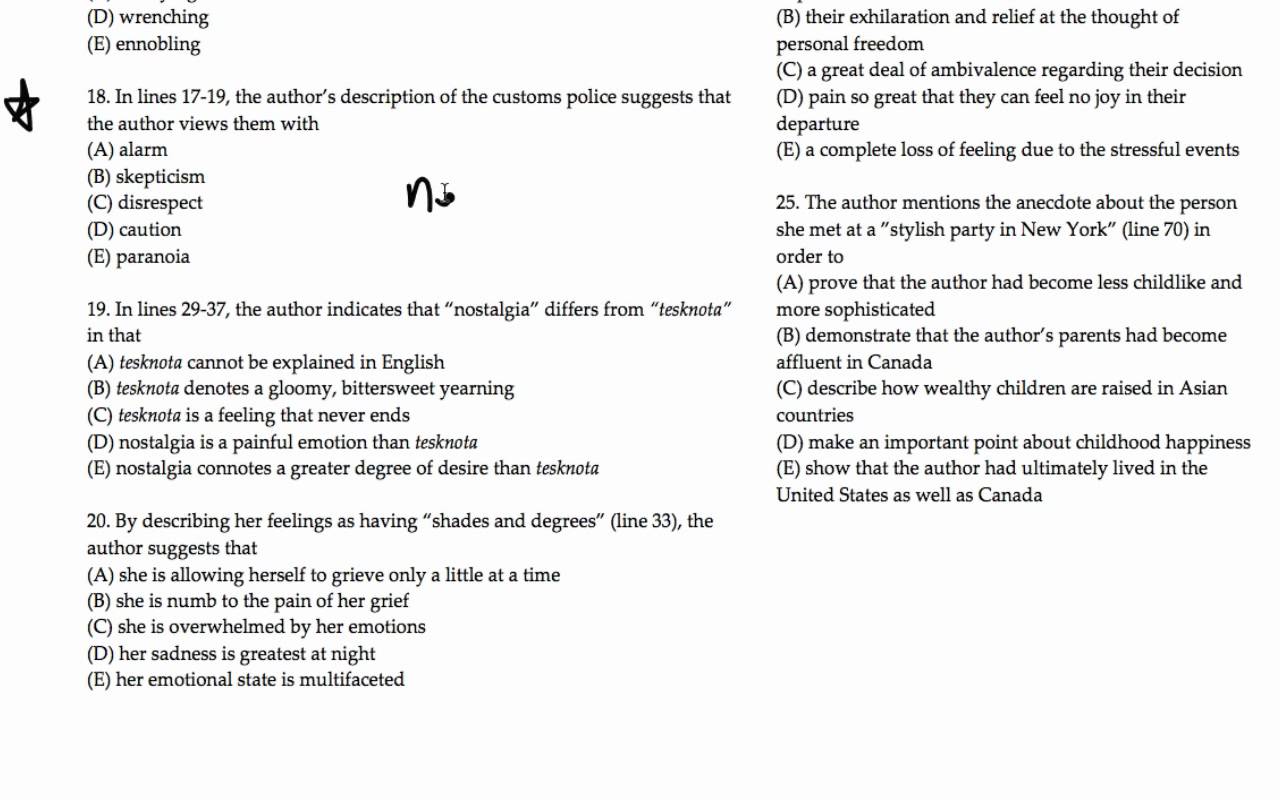![Don’t be an average SAT student
(adsbygoogle = window.adsbygoogle || []).push({});](https://www.onlinesatclass.com/wp-content/uploads/2014/04/people-taking-a-test.jpg) Meet Your SAT Avatar Or, How to Avoid the Average SAT Mistakes to Score High Listen up — This might be the most important lesson you learn to prepare for the SAT. If you’ve taken a practice SAT, you noticed that the questions progress in difficulty, from easy, to pretty hard, to super hard. That’s no accident. The ETS, aka the people who write the questions, have been very deliberate about ordering the SAT to get harder as it goes. Their tricky methods work. Every year, the ETS manages to trip-up the average, gullible, overconfident high school student. The average SAT student get about half the answers right, and earn an ordinary score. But that just lets the extraordinary students — the ones they couldn’t fool — stand out. Lucky for you, all it takes is a little knowledge, strategy, and practice to become extraordinary and beat the test maker’s at their own game. You just have to learn how to NOT be average. For your first lesson, let’s take a closer look at the order of difficulty levels in the SAT. Figuring out the average SAT student From You Could Do this in Your Sleep, to No Chance in Hell: The Various Difficulty Levels of SAT questions Easy for the average SAT student What happens in the mind of an unsuspecting teen when at first the test is a piece of cake? He thinks, Hey, this isn’t so bad! I don’t know what I was so afraid of. The easy questions lure you in and make you feel secure so you let your guard down. Almost every student...
Meet Your SAT Avatar Or, How to Avoid the Average SAT Mistakes to Score High Listen up — This might be the most important lesson you learn to prepare for the SAT. If you’ve taken a practice SAT, you noticed that the questions progress in difficulty, from easy, to pretty hard, to super hard. That’s no accident. The ETS, aka the people who write the questions, have been very deliberate about ordering the SAT to get harder as it goes. Their tricky methods work. Every year, the ETS manages to trip-up the average, gullible, overconfident high school student. The average SAT student get about half the answers right, and earn an ordinary score. But that just lets the extraordinary students — the ones they couldn’t fool — stand out. Lucky for you, all it takes is a little knowledge, strategy, and practice to become extraordinary and beat the test maker’s at their own game. You just have to learn how to NOT be average. For your first lesson, let’s take a closer look at the order of difficulty levels in the SAT. Figuring out the average SAT student From You Could Do this in Your Sleep, to No Chance in Hell: The Various Difficulty Levels of SAT questions Easy for the average SAT student What happens in the mind of an unsuspecting teen when at first the test is a piece of cake? He thinks, Hey, this isn’t so bad! I don’t know what I was so afraid of. The easy questions lure you in and make you feel secure so you let your guard down. Almost every student...
 Tests are scary. A few hours in a bright room can determine so much. With students coughing, proctors lagging, and a clock tick-tocking away, your academic future could be derailed if things don’t go as planned. SAT stress is absolutely normal. Nerves are a pain when taking tests. The SAT, the TOEFL, the AP exam, and the IB exam are all absolutely stressful experiences. I get that. We all get that; anyone who teaches tests for a living knows that nerves can be as damaging to a test taker as lack of sleep and no preparation. But, luckily, there might be a cure for your SAT stress. Ending SAT Stress There is a simple rule for ending SAT test day nervousness. It’s not rocket science, nor is it magic. It’s just experience. Hardened pro athletes don’t get nervous during the finals. Well-trained soliders don’t mess up during a conflict. And a SAT test taker who has seen it all will not lose her head when a past perfect sentence correction question has a 2/3 preposition split. The key to ending SAT test day nerves is to both be prepared for the test and have experience taking the test. You know you will probably take the test more than one time. I think you should plan on that and split your SAT prep into two phases: Before First Test: In this phase, you gain as much strategy as possible. You learn how to pace yourself & how to do tricks like the (Rate T) or the (Average Pie) or the (Extreme Answers on RC). You won’t do great on this exam, but that’s...
Tests are scary. A few hours in a bright room can determine so much. With students coughing, proctors lagging, and a clock tick-tocking away, your academic future could be derailed if things don’t go as planned. SAT stress is absolutely normal. Nerves are a pain when taking tests. The SAT, the TOEFL, the AP exam, and the IB exam are all absolutely stressful experiences. I get that. We all get that; anyone who teaches tests for a living knows that nerves can be as damaging to a test taker as lack of sleep and no preparation. But, luckily, there might be a cure for your SAT stress. Ending SAT Stress There is a simple rule for ending SAT test day nervousness. It’s not rocket science, nor is it magic. It’s just experience. Hardened pro athletes don’t get nervous during the finals. Well-trained soliders don’t mess up during a conflict. And a SAT test taker who has seen it all will not lose her head when a past perfect sentence correction question has a 2/3 preposition split. The key to ending SAT test day nerves is to both be prepared for the test and have experience taking the test. You know you will probably take the test more than one time. I think you should plan on that and split your SAT prep into two phases: Before First Test: In this phase, you gain as much strategy as possible. You learn how to pace yourself & how to do tricks like the (Rate T) or the (Average Pie) or the (Extreme Answers on RC). You won’t do great on this exam, but that’s...
 “A goal without a plan is just a wish.” ― Antoine de Saint-Exupéry To do well on the SAT, you must set up an SAT study plan & you must follow that study plan. Over the last few years I have encountered dozens of students trying to prep for the SAT at very different stages. Some brilliant kids start in middle school, others won’t think about the SAT until the night before. Regardless of your situation, you need a plan of action if you hope to do well. I will look at 3-month, 1-month, & 1-week SAT study plans in this article. If you have a unique situation (6 months, 1 year, 4 years!), simply leave a comment below and I’ll address your situation for you. SAT Study Plan Goals Each study plan will work through a different set of goals. Not all plans are created equal, and a student with 1 week to prep for the SAT will have markedly different goals than someone who has alloted 3 months to study. Throughout each SAT study plan, we have overall goals & weekly goals. This is intended to guide our daily work so that it has a tangible outcome. You will take up to 6 tests. SAT Textbook Requirements You *must* purchase the Official Guide to the SAT. All of your practice tests & most of your practice problems will come from the Official Guide. Without this book your study is pretty much worthless. The Official Guide is the only required book, though you should purchase the following books/courses as well. (1) Pwn the SAT Math: if you are...
“A goal without a plan is just a wish.” ― Antoine de Saint-Exupéry To do well on the SAT, you must set up an SAT study plan & you must follow that study plan. Over the last few years I have encountered dozens of students trying to prep for the SAT at very different stages. Some brilliant kids start in middle school, others won’t think about the SAT until the night before. Regardless of your situation, you need a plan of action if you hope to do well. I will look at 3-month, 1-month, & 1-week SAT study plans in this article. If you have a unique situation (6 months, 1 year, 4 years!), simply leave a comment below and I’ll address your situation for you. SAT Study Plan Goals Each study plan will work through a different set of goals. Not all plans are created equal, and a student with 1 week to prep for the SAT will have markedly different goals than someone who has alloted 3 months to study. Throughout each SAT study plan, we have overall goals & weekly goals. This is intended to guide our daily work so that it has a tangible outcome. You will take up to 6 tests. SAT Textbook Requirements You *must* purchase the Official Guide to the SAT. All of your practice tests & most of your practice problems will come from the Official Guide. Without this book your study is pretty much worthless. The Official Guide is the only required book, though you should purchase the following books/courses as well. (1) Pwn the SAT Math: if you are...
 Process of elimination is a tricky beast. In a previous post, I talked about aggressive elimination as a very useful technique for ensuring right answers. I am certainly not the only tutor who suggests crossing out wrong answers. But I want to introduce a different way of thinking about multiple choice tests. I want to advocate searching for wrong answers in your process of elimination strategy. In this 12 minute post, I explain exactly why you should start searching for wrong answers and then I give 3 examples (1 math, 1 reading & 1 writing) where I focus on crossing out wrong answers. I do this because I want to be left with the right answer. That is the simple outcome of SAT process of elimination. That makes sense, doesn’t it? If you are left with the right answer, and if you know exactly why the wrong answers are wrong, then you MUST have gotten the question correct. Enjoy the video & my discussion below. Leave a comment if you have questions, comments, or screams of angst. Why wrong answers are key for process of elimination The SAT is definitely a difficult test for thousands of students. If you keep reading questions, picking answers, and hoping for the best, maybe you lack knowledge, maybe you lack strategy, and maybe you are asleep while taking the test. But I would wager many American dollars that you are just focusing on the wrong thing during prep. When you practice, are you focusing on right answers? Of course you are!Everyone does. But, have you ever heard of a student getting the same questions on a real test that...
Process of elimination is a tricky beast. In a previous post, I talked about aggressive elimination as a very useful technique for ensuring right answers. I am certainly not the only tutor who suggests crossing out wrong answers. But I want to introduce a different way of thinking about multiple choice tests. I want to advocate searching for wrong answers in your process of elimination strategy. In this 12 minute post, I explain exactly why you should start searching for wrong answers and then I give 3 examples (1 math, 1 reading & 1 writing) where I focus on crossing out wrong answers. I do this because I want to be left with the right answer. That is the simple outcome of SAT process of elimination. That makes sense, doesn’t it? If you are left with the right answer, and if you know exactly why the wrong answers are wrong, then you MUST have gotten the question correct. Enjoy the video & my discussion below. Leave a comment if you have questions, comments, or screams of angst. Why wrong answers are key for process of elimination The SAT is definitely a difficult test for thousands of students. If you keep reading questions, picking answers, and hoping for the best, maybe you lack knowledge, maybe you lack strategy, and maybe you are asleep while taking the test. But I would wager many American dollars that you are just focusing on the wrong thing during prep. When you practice, are you focusing on right answers? Of course you are!Everyone does. But, have you ever heard of a student getting the same questions on a real test that...
 There is no shortage of SAT blogs flooding the internet with test prep advice. Do a quick search and you’ll find hundreds of teachers, tutors, parents, former students, awesome admissions officers, and other experts shouting their tips and tricks. I’ve scoured the internet to bring you 10 pre-approved SAT blogs that offer solid testing tools and advice. The criteria I used was not exhaustive, but they were very important. Every blog must have a single author, focus on SAT more than other subjects, update regularly, and pass the ‘cool’ test. The cool test just means that I like these people & plan to make them my friend! I have the pleasure of knowing several of these folks personally — through the internet or in person — and I can vouch for most of them. If you are starting your SAT prep now, bookmark each of these SAT blogs now. But don’t forget, I also write a pretty amazing SAT blog. So… don’t stray for too long. 🙂 Amazing SAT Blogs 1- PWN the SAT Mike pwned the SAT with a 2400 score, and now he’s dedicated to helping you do the same. He tutors New York’s best and brightest, but he also doles out wisdom for free to the internet masses (i.e. you). He offers sample questions, shares his personal techniques, and outlines study guides for each subject. He literally wrote the book on pwning the math section, so be sure to check out his guide if that’s your weak spot. 2 – Perfect Score Project Mom knows best at this part resource center, part study guide, part personal odyssey blog. Debbie decided to...
There is no shortage of SAT blogs flooding the internet with test prep advice. Do a quick search and you’ll find hundreds of teachers, tutors, parents, former students, awesome admissions officers, and other experts shouting their tips and tricks. I’ve scoured the internet to bring you 10 pre-approved SAT blogs that offer solid testing tools and advice. The criteria I used was not exhaustive, but they were very important. Every blog must have a single author, focus on SAT more than other subjects, update regularly, and pass the ‘cool’ test. The cool test just means that I like these people & plan to make them my friend! I have the pleasure of knowing several of these folks personally — through the internet or in person — and I can vouch for most of them. If you are starting your SAT prep now, bookmark each of these SAT blogs now. But don’t forget, I also write a pretty amazing SAT blog. So… don’t stray for too long. 🙂 Amazing SAT Blogs 1- PWN the SAT Mike pwned the SAT with a 2400 score, and now he’s dedicated to helping you do the same. He tutors New York’s best and brightest, but he also doles out wisdom for free to the internet masses (i.e. you). He offers sample questions, shares his personal techniques, and outlines study guides for each subject. He literally wrote the book on pwning the math section, so be sure to check out his guide if that’s your weak spot. 2 – Perfect Score Project Mom knows best at this part resource center, part study guide, part personal odyssey blog. Debbie decided to...
 Aggressive elimination is a way of thinking about process of elimination and multiple choice tests. The goal with any elimination method is to know what you are looking for and how to find it. Today, we are going to identify the major causes of wrong answers and a solution you might not have heard before. It’s called aggressive elimination. It’s like process of elimination, as mentioned in all the prep books, but, you know, more aggressive. Does This Sound Familiar? You are pretty good about getting it down to two answer choices, but you ALWAYS seem to pick the wrong answer. You think you have the right answer, but you still get the question wrong. You work really hard, do your math, or reading, or grammar, and get a solution that is in the answer choices, only to find out you are wrong. It’s so freakin’ annoying! I like to teach aggressive elimination in my SAT classes and pretty much without fail will have students telling me that they always get it down to two and always pick the wrong answer. Other times, students get the right answer for the wrong question. For example, if you see a problem like this: If the three interior angles of a triangle are x, 2x, and 3y, what is x in terms of y? Before students even start to attempt this problem, they flip out, run away, or otherwise find an excuse to avoid dealing with it. Are you one of those people? Do you see difficult questions and either immediately draw a triangle or immediately say, “Nope. Not a chance. Cannot...
Aggressive elimination is a way of thinking about process of elimination and multiple choice tests. The goal with any elimination method is to know what you are looking for and how to find it. Today, we are going to identify the major causes of wrong answers and a solution you might not have heard before. It’s called aggressive elimination. It’s like process of elimination, as mentioned in all the prep books, but, you know, more aggressive. Does This Sound Familiar? You are pretty good about getting it down to two answer choices, but you ALWAYS seem to pick the wrong answer. You think you have the right answer, but you still get the question wrong. You work really hard, do your math, or reading, or grammar, and get a solution that is in the answer choices, only to find out you are wrong. It’s so freakin’ annoying! I like to teach aggressive elimination in my SAT classes and pretty much without fail will have students telling me that they always get it down to two and always pick the wrong answer. Other times, students get the right answer for the wrong question. For example, if you see a problem like this: If the three interior angles of a triangle are x, 2x, and 3y, what is x in terms of y? Before students even start to attempt this problem, they flip out, run away, or otherwise find an excuse to avoid dealing with it. Are you one of those people? Do you see difficult questions and either immediately draw a triangle or immediately say, “Nope. Not a chance. Cannot...
![Don’t be an average SAT student
(adsbygoogle = window.adsbygoogle || []).push({});](https://www.onlinesatclass.com/wp-content/uploads/2014/04/people-taking-a-test.jpg)
![Don’t be an average SAT student
(adsbygoogle = window.adsbygoogle || []).push({});](https://www.onlinesatclass.com/wp-content/uploads/2014/04/people-taking-a-test.jpg)






 Let me help you pass your SAT! Find out how throughout this website. You rule!
Let me help you pass your SAT! Find out how throughout this website. You rule!